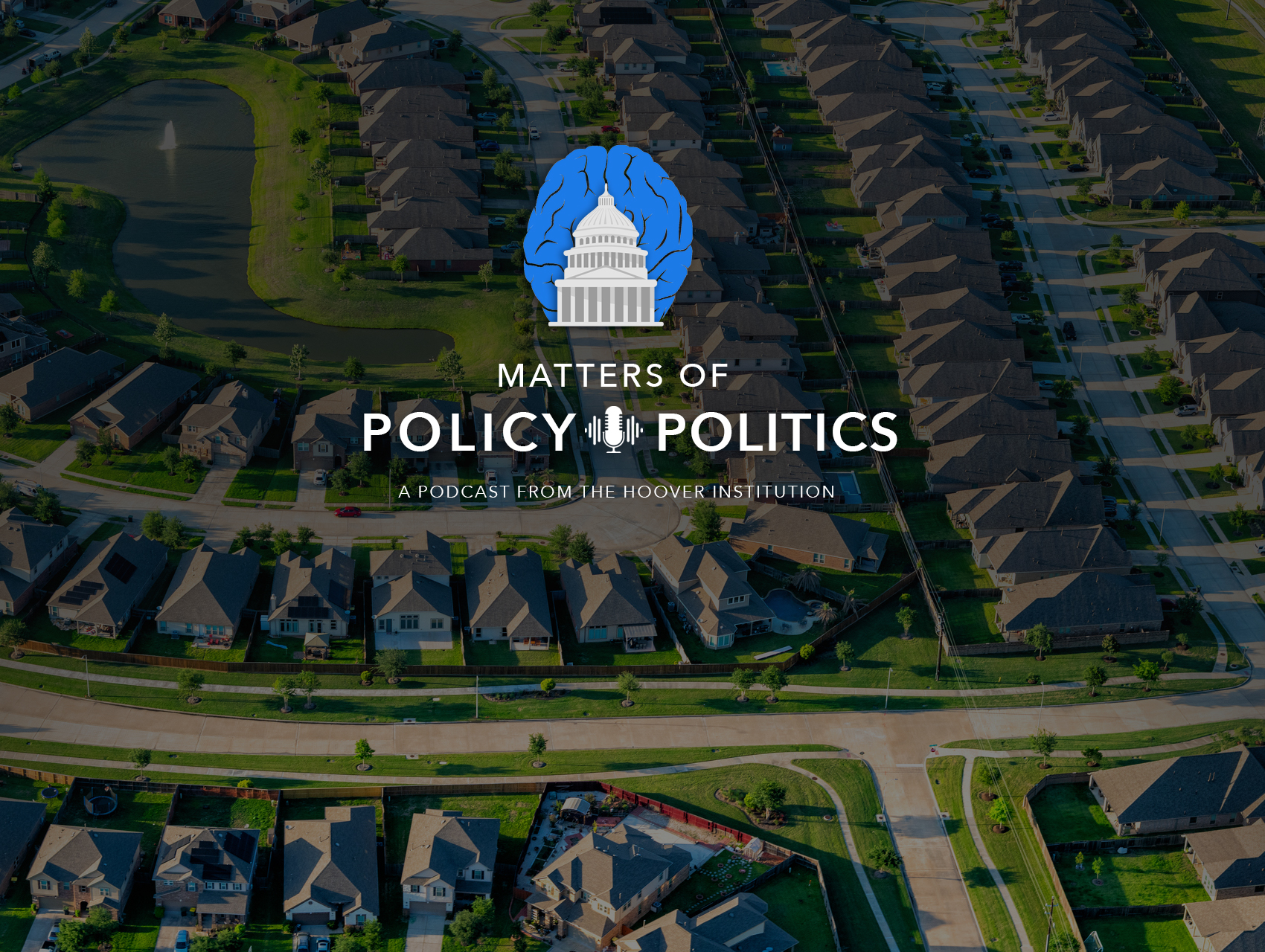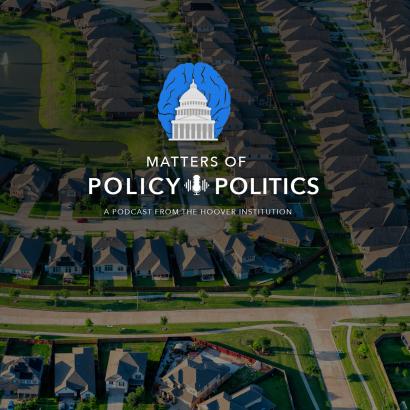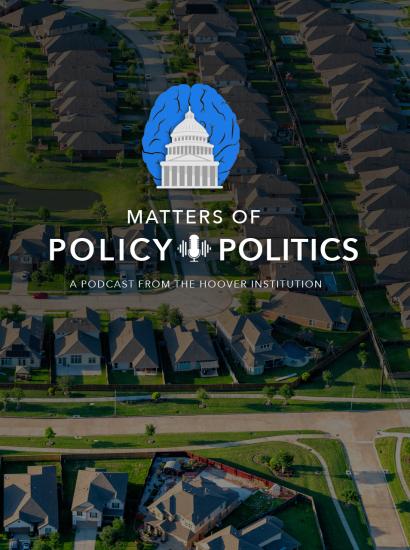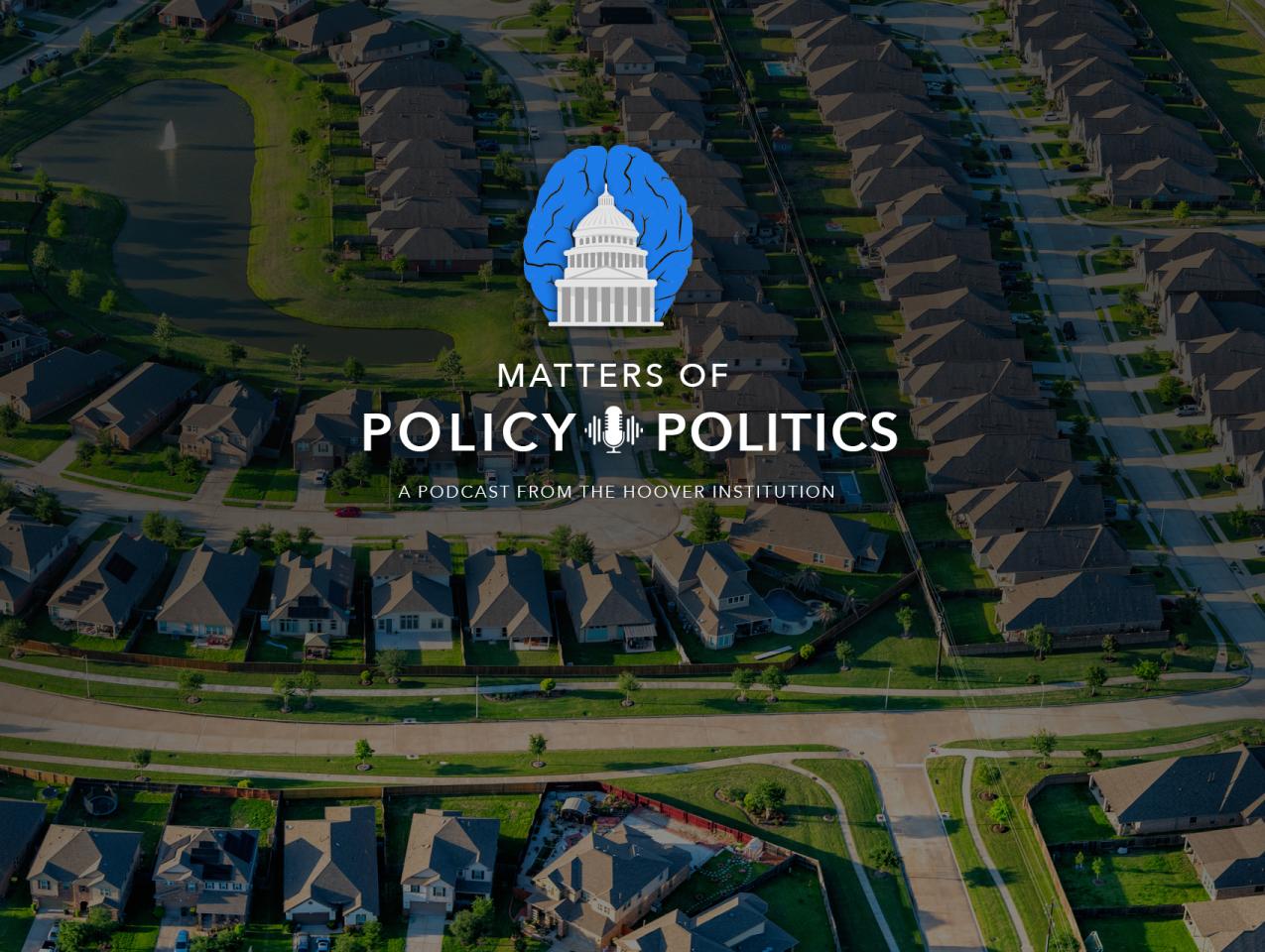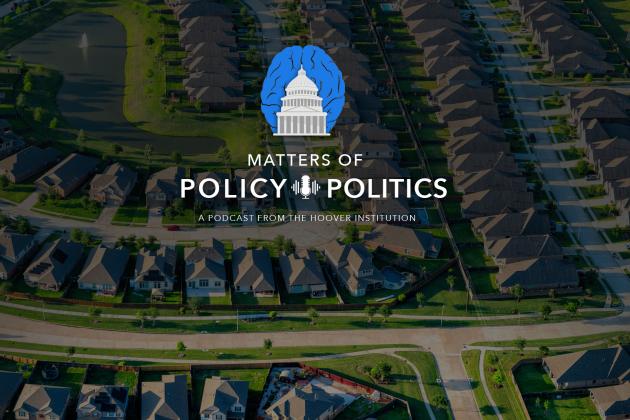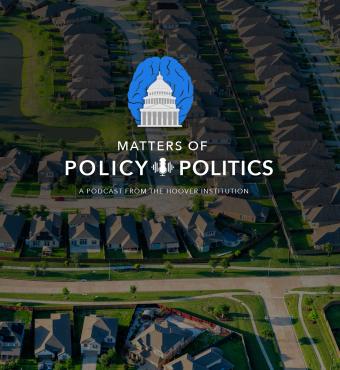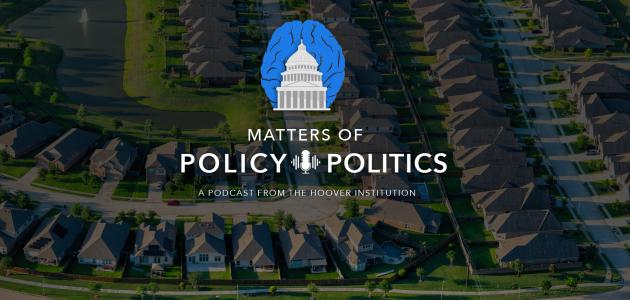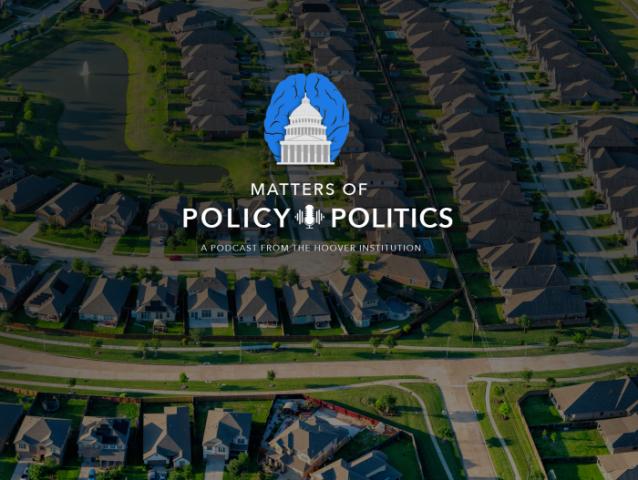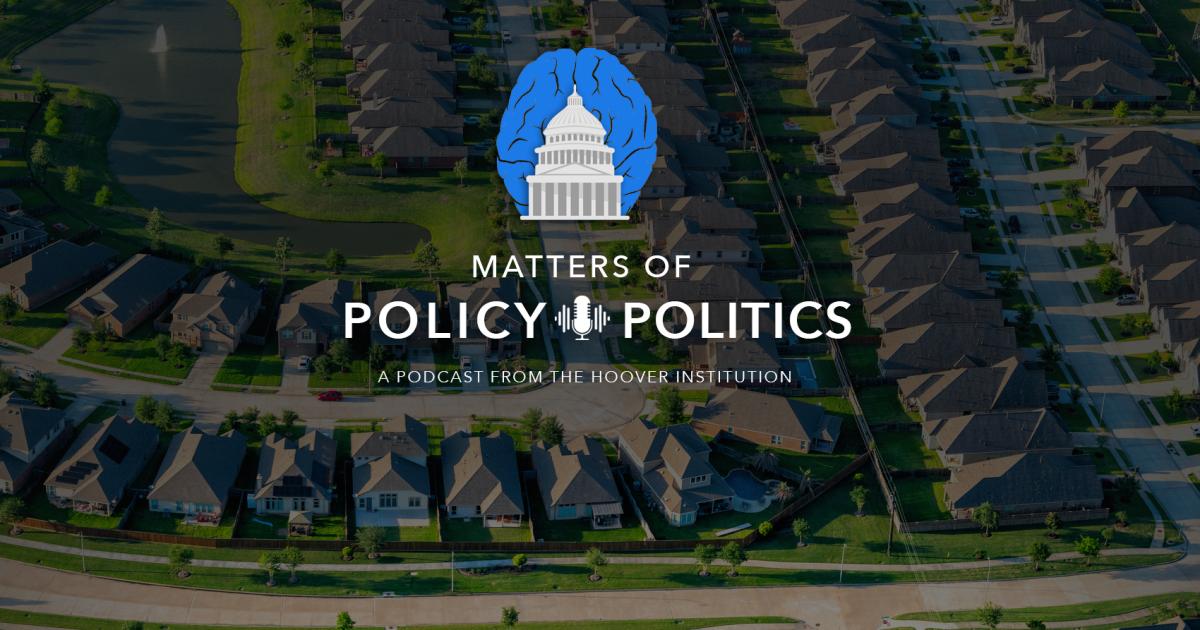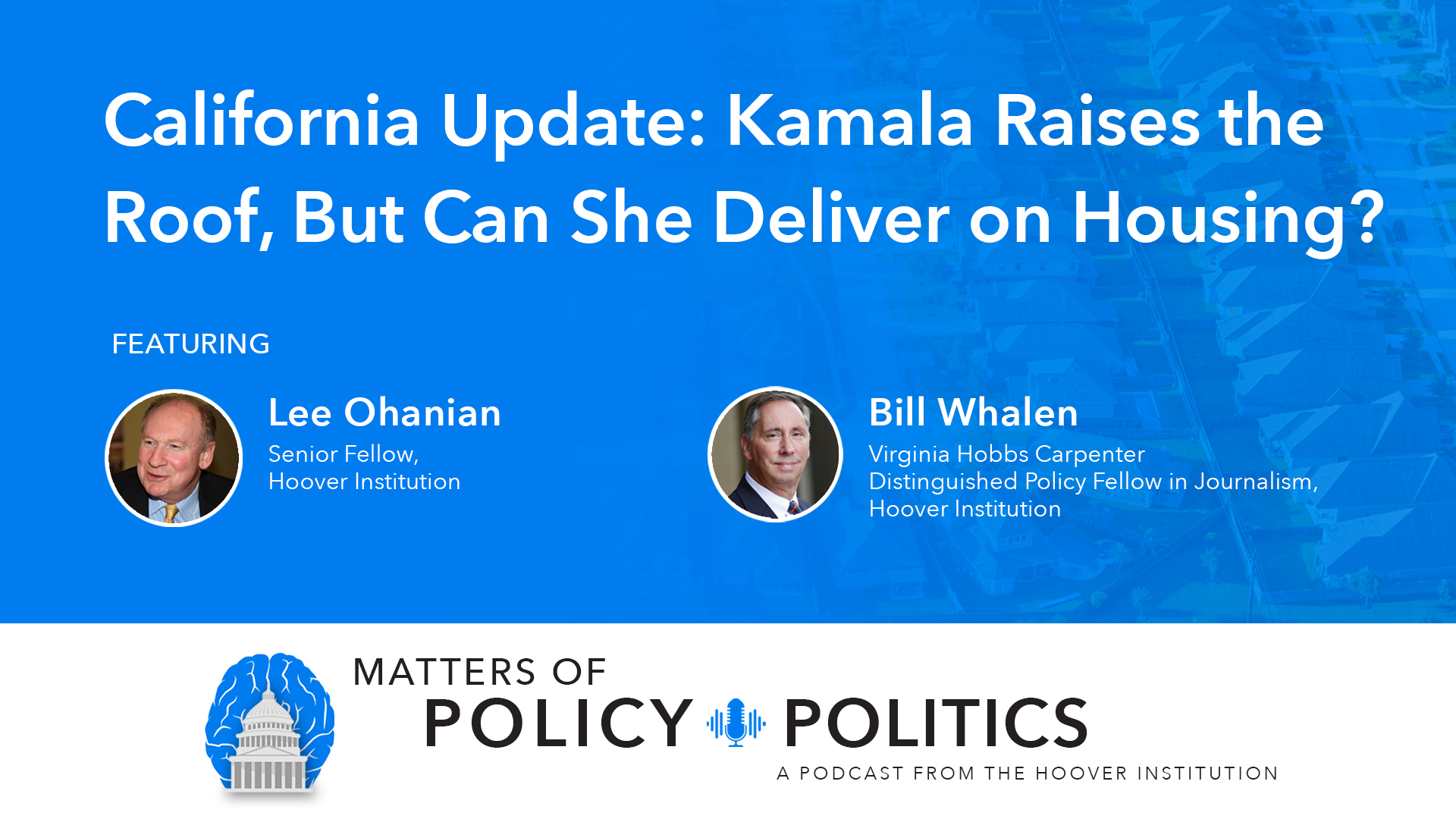The Democratic National Convention turns out to be a tale of two Californians – Vice President Kamala Harris becoming her party’s standard-bearer; Governor Gavin Newsom left out of the speakers’ lineup (other than a two-minute cameo during the roll-call vote).
Hoover senior fellow Lee Ohanian and distinguished policy fellow Bill Whalen, both contributors to Hoover’s California on Your Mind web channel, join Hoover senior product manager Jonathan Movroydis to discuss in the Golden State including Harris and Newsom’s reversals of fortune, the Golden State’s struggles with job-retention, plus whether a Harris presidency can succeed where a Newsom governorship seems destined to fail (she wants to build three million new homes nationally in her first term; Newsom is far behind on his downsized goal of 2.5 million new California homes by the decade’s end).
Jonathan Movroydis: It's Monday, August 26, 2024, and you are listening to Matters of Policy and Politics at Hoover Institution podcast devoted governance, and balance of power here in America and around the free world. I'm Jonathan Movroydis, senior product manager at the Hoover Institution. And I'm sitting in the chair of Bill Whalen, the Virginia Hobbs Carpenter Distinguished Policy fellow in journalism, so that he can answer questions and provide commentary about California policy and politics in which he is well versed.
Bill Whalen, in addition to being a Washington Post columnist, writes weekly for Hoover's California on Your Mind web channel. Whalen is joined today by Lee Ohanian, Hoover Institution senior fellow and professor of economics, and director of the Edinger Family Program in macroeconomic research at the University of California, Los Angeles.
Ohanian also writes weekly about the policy environment of the Golden State for California on Your Mind. Good day, gentlemen. Let's talk about the latest developments in policy and politics in the Golden State. Kamala Harris star shined bright at the democratic convention in Chicago last week. Her campaign has shrouded Harris around the theme of joy and cast her opponent as weird doom and gloom.
A gentlemen, your colleague Niall Ferguson put it this way in a column for the Free Press. Quote, since Kamala Harris has become the democratic nominee for the presidency, the architect of the Harris campaign has managed to create their own dream house. This one isn't bubblegum pink, but it has the policy equivalents of a pool party.
He goes on, while Kamala reads scripted lines, strikes, staged poses, and avoids all precedent campaign vacuousness unsurpassed in the history of American politics. On the other screen, we have a different docudrama, the dark, fissile energy of Donald Trump reviving the nightmare vision of American carnage and taking it global.
Ferguson is referring to Trump's interview with Elon Musk on X, in which the former president talked about the risks of nuclear war. In this campaign of joy, Team Harris and the DNC noticeably iced out California Governor Newsom off the stage at the Democratic convention. Bill, could this be because of the sad state of affairs in the Golden State, that doesn't square well with the campaign of joy.
Bill Whalen: Yeah, I'm not sure exactly why. So to be clear, Gavin Newsom did have a speaking role at the Democratic convention. He spoke for two minutes when they did the roll call vote on the second night, I believe it was. But what was noticeable was that he did not have a speaking gig up on the stage.
He was not one of the many governors and members of Congress and even fellow California lawmakers who all got a chance to go up to the podium and say a few kind words about Kamala. So, the fact that Gavin Newsom could go from a very prominent Biden surrogate to a very prominent governor left on the sidelines does scratch heads, and I'm just not sure why.
I don't know if it was too much California for them to absorb. It's a tough situation for Newsom in this regard. There's really only one positive way his people could spin it, which is that, well, Gavin Newsom is so talented and polished of a speaker that he would blow away Kamala Harris.
Well, you're now in a mode where you have to say everything nice about Kamala Harris, so you cannot diss her that way. So, he has to kind of sit there and take it, if you will. I think it might have been as simple as the numbers game, but maybe it also was a little too much California to digest, because what you saw in that two-minute version, it would have been a five-minute version otherwise.
Was Newsom saying that California is the land of progressive hopes and dreams and look at all the wonderful things we have on display, and, boy, in 2024, that is certainly leading with your chin to say that California is the harbinger of where America should be and where Kamala Harris will take it.
But I'm very curious to what you guys think is going through Gavin Newsom's head right now. This is something I've written for California Mindful later this week. There is interview floating around social media. I don't know if you guys have seen it or not, but it's Newsom at the convention, and he's doing, I believe, a podcast.
And it's kind of a lighthearted interview. But at one point they asked him, what did you think about the passing of the torch, the handing of the baton, the relay to, from Biden to Harris? And here's what Newsom said. I wrote it down, quote, we went through a very open process, a very inclusive process, it was bottom up.
I don't know if you know that he obviously is being very sarcastic because it was not inclusive, was not bottom up. But then Newsom just kind of paused for a second. Then he kind of muttered under his breath, that's what I've been told to say. And now maybe I'm kind of getting into subruder film mode here and reading too much into this little segment.
But that strikes me as a guy who kinda has issues, and the issue might be as simple as this. A couple months ago he's very prominent Biden supporter and kinda neatly lined up for run in 2028 if Biden crashed and burned, which looked like he was going to, now here he is just a couple of months later, and if Kamala Harris wins in November, then she'll run again in 2028.
Gavin Newsom will not run for president because he'd have to wait until 2032. By then, Lee, he will have been out of office for what, five, six years. He'll be kind of an afterthought in democratic politics. So, I think that he's probably just kind of wrestling with a lot of demons right now.
That's my take. What do you think, Lee?
Lee Ohanian: Well, this is a gentleman whose ambition, I think everyone agrees, was the White House. The governor's office was not gonna be his last political stop. And he's got to be very disillusioned and probably bitter at this point. He does have a touchy personality, and I think we see that in the quote you just presented.
The reality that he has to face is that California just simply is not popular politically across most of the country. And tying together two Californians, I think, politically would just not be a wise thing. And the Democratic Party now has, I think, in my opinion, has really jettisoned him.
And he must be very, very bitter about this because he was the guy who stepped up and stood in for Joe Biden and who kept saying, there's no cognitive issues. This guy is the sharpest person in the room. I've talked to him. I've spent time with him. And he was there for Biden twenty-four-seven, and now he's largely damaged goods.
So he can't be happy about this. And, Bill, his political future looks really very clouded at this point. There's no possibility, really, for the US Senate, even if he was interested in that. And as you know, if Harris wins here in 24, she'll be running again in 28 or what, eight years until 2032.
As you know, he would have been out of office for six years. And it's not a particularly distinguished governorship. I say that somewhat charitably it's very easy to make the case that it's largely a failed governorship. So, just how quickly things can turn politically for a person who many thought was going to be one of the leading Democrats and now seems to be really relegated to the sidelines of this party.
Bill Whalen: Yeah, I think it had to be tough for him to be on the floor and not up on the stage and not getting credit for a lot of things that the Harris campaign extolled his Democratic virtues, for example, same-sex couple, same-sex marriage. Well, Gavin Newsom got the ball rolling on that in 2004, just very new to being mayor of San Francisco.
And what does he do? He allows city hall to hand out marriage licenses. And yes, it caused a lot of problems for Democrats in 2004. There are people from John Kerry's campaign who will hate him forever for doing this because the Bush campaign jumped on that as a wedge issue.
But Newsom is kind of the godfather of same-sex marriage in that regard. He deserves credit for it. A lot of what the Harris campaign talked about in terms of initiatives, and we'll get to one in a few minutes here, housing, which you've written about, Lee, but just their visions, what they would do with America, a lot of that's already underway in California.
So, for Newsom to kinda sit there on the floor listen, this has got to be hard. But what I think, and Jonathan touched on this, the buzzword in the convention was one of joy, that Kamala is, if she's not Barack Obama and hope that she's the candidate of joy, joy is on the way.
Well, Gavin Newsom now has to go back to Sacramento. And you know what? That is not a very joyful experience right now because why? Your finances are in a mess. The state's finances are in a mess. He has a bill signing period. Prepared to deal with. He has a legislature that can always cause headaches, if you will.
It's just not as fun as being out on the campaign trail and taking shots at Donald Trump. And being kind of adulated as the next great thing in Democratic politics. So it's kind of a thud for him in 2024, kind of a bad coming down.
Lee Ohanian: Well, ironically, he really wants to be a national politician.
And you can see that's where his heart is. That's what he does with great joy when he talks about DeSantis or Governor Abbott from Texas. And Gavin made the mistake of just not minding the story. He was off on the road, campaigning against red states and campaigning for political people in blue states.
And meanwhile, crime in California was rising at a faster rate than the rest of the country. Homelessness is at a record, $24 billion was spent on homelessness, with hardly any accounting of where those funds were. Housing is at the point where the median priced home in California is over $900,000.
These are all issues that boil down to policies, and these were policies that Newsom could have taken leadership on. And yet, they all got worse under Newsom. And almost every newspaper in the country, every media source, including the New York Times, including the Washington Post, have run photos in the last year or two showing the Tenderloin district of San Francisco or South of Market or the Civic Center.
Showing just huge tent encampments, drug use openly on the street, fentanyl users who are passed out or who were being brought back with Narcan. A financial district, a business center that looks like a ghost down. This all falls on Gavin Newsom, it's not a good look for him.
And it's not one that the Democratic Party can afford.
Bill Whalen: Yeah, now, there is another act in this opera to play out. And let's assume, for the sake of argument, that Harris wins the election in November. Then she has to build an administration. And this is what I wrote about for California on your mind this week.
I went back and I looked at Richard Nixon and Ronald Reagan. And looked at how they built their administrations and how they tapped into California. And here's what's interesting. If you look at Nixon in 1968, 69, he has a couple of pipelines of talent he can tap into.
He can tap into people who worked on his ill fated gubernatorial run in 1962, for example. That's where he first met HR Haldeman, who'd go on to be his chief of staff. And he could tap into his ill fated presidential run in 1960. And there he chose a gentleman named Robert Finch, who in 1968 was lieutenant governor of California.
And he made Finch his health secretary what the time was, health, education, and welfare. So there was California talent. Let's fast forward to 1980 with Ronald Reagan. Reagan also had a couple of pipelines. He had his presidential run in 1976, four years before 1980. And then he had people who'd worked with him in Sacramento, he was California's 33rd governor from 1966 to 1974.
So who falls in this category? Well, it's Caspar Weinberger, who was at one point Reagan's finance director in Sacramento. It's Ed Meese and Michael Deaver, two thirds of the famous White House Troika. They both worked for Reagan in Sacramento. It's Marty Anderson, a fabled Hoover economist, who was kinda with Reagan before Reagan was cool in 1976.
And worked with Reagan on that campaign for economic advice, one of the White House's senior policy advisors. So Reagan had California pipelines, too. Harris is not in the same position, though, because why? She could, in theory, tap into pipeline. She has three statewide runs, two for attorney general, one for senator.
She has the failed presidential bid in 2019. But it's a different campaign, one really kind of built overnight by what looks like Clinton, Obama people, especially the Obama people. Her convention acceptance speech was written by an Obama speech writer, for example. A lot of the optics, a lot of language is just straight out of Obama 2008.
So what I've looked at was the question of who she would maybe tap into in California to bring in. And here I came down to three people of interest. One is Laphonza Butler. Who's Laphonza Butler? She is the answer to the trivia question of who did Gavin Newsom appoint after Dianne Feinstein passed away, she is interim senator.
She will step down after November when Adam Schiff presumably wins that election. Butler is a veteran of California. She is very thick in the labor movement. She also is a former president of Emily's List, the political action committee, which gives money to pro choice democratic women. She would seem a obvious candidate for something like labor secretary if she wanted to angle for it.
Second person I looked at was Lainey Kounalakis, who interests me in this regard, lieutenant governor of California. She's buddies with Harris. She spoke on the stage, unlike Newsom, in Chicago. She said a lot of words about how Harris was a friend, a mentor, talked about cracking the glass ceiling, women in power, blah, blah, blah.
She maybe could get tapped for a position in Washington. Now she's running for governor in 2026, but that's a very crowded field. Maybe she decides it's wiser to go to DC than risk it all running for governor. But then the big one to look at would be getting back to what we talked about to start this podcast, Gavin Newsom.
And this is why I mentioned that little crack he made about that's what I've been told to say. Newsom could go to Washington if offered, if he wants to. And I think there are two positions that kind of scream to him. One is transportation secretary, like Pete Buttigieg.
It's a chance to go around and be political around the country. But the other one is climate czar. Do what John Kerry did, just kind of fly around the world and give long-winded speeches and not really do much. But at least be a minister with something of portfolio.
So Newsom could bail on California in 2025, but if he does, you heard it here first. But anyway, just, it shows that this play is not kind of thoroughly played out late.
Lee Ohanian: Well, Bill, it's interesting, at, I think, back to the fall of 2020, when Newsom was passed over by the Democratic Party to chair the state's delegation to the Democratic National Convention.
I believe it typically has been in the past that the California governor who has chaired the delegates. And in 2020, he was passed over. And there was kind of a complicated co chairing because of the divisions between Sanders and Biden at that time. I believe Ro Khanna was taken as the Sanders guy, and Hilda Solis as a state lawmaker and a labor advocate was picked by the Biden group.
And then I believe Barbara Lee may have also been a part of that as well. And I thought that was interesting because at that time, Newsom was popular. People viewed him as successfully leading California's challenges through COVID. This was before the ill-fated French Laundry dinner that he had where he really took a hit to his popularity.
I suspect his approval rating was probably close to 60% at that time. And he was viewed as being not sufficiently progressive at that time, about four years ago. So I think then in his strategic mind, he thought, okay, I've really gotta tack. I've gotta tack hard left if I'm gonna start advancing, particularly here in California, and get the kind of support I need.
And he certainly has done that. He certainly has tacked hard left. Ironically, he may have been better off if he had just been somewhat more moderate. Certainly he would have been better off with the rest of the country if he had. Now, as you note, perhaps there's a cabinet position open for him, but in the absence of that, his political future looks like it may be coming to an end.
Bill Whalen: Well, I think he's going to have a very small window to kind of decide what to do if there's a plan B, if there's an option to go east. Cuz she wins the election, that's early November. Let's assume it's settled early November. He has pretty much until Thanksgiving to decide if he wants to go to DC or not, because Because why?
In early December, a California governor turns his or her attention to the economy. Specifically, they have to sit down with their Department of Finance and figure out their budget proposal. Which means, Lee and Jonathan, that they have to sit down and look at the state of the economy and try to figure out how much money is coming in.
And I know Lee has been writing about California's economy, so maybe you should talk about that next.
Jonathan Movroydis: Sure, Lee, in your recent article for California on Your Mind, you discussed California's anemic job growth relative to the rest of the nation over the past two and a half years.
You write, quote, between January 22 and June 2024, employment in us private businesses increased by about 7.32 million jobs. Of these 7.32 million jobs, only about 5400 were jobs created in California's businesses, representing about 0.7% of the us figure. That's not so joyful, Lee. Can you explain why so much slow growth, given the diversity of the Golden State's economy?
And that still remains the world's fifth largest economy since 2017. Although just as recently as last year, I think, Newsom declared California to be the world's fourth largest economy, overtaking Germany.
Lee Ohanian: Well, I mean, California, with 39 million people and a lot of very highly productive people. Transformational unicorn businesses such as Google and Apple, Oracle, Hewlett Packard.
Interestingly, many of those businesses relocated to Texas, but they still have large footprints in the state. And there's no doubt California has an incredibly powerful economy. The issue is where it's been going the last couple of years and where it will go in the future. And doing business in California is just simply remarkably expensive.
Workers are expensive because it's expensive to live here, and to get people to live here and work here requires paying them a lot. We have, according to most surveys, if not the most regulated state, certainly one of the top three most regulated states, if not the most heavily taxed state.
One of the most heavily taxed state, according to the Tax Foundation, which is a nonpartisan research center, is the standard reference for evaluating tax policies and fiscal matters across the US. And interestingly, we were talking about Newsom. Newsom will bring out factoids where he suggests, California is not a high tax state.
California is not a highly regulated state. We're the fifth largest economy, or perhaps at one point the fourth largest, largest economy that really belies the fact that you talk to anyone in business and it's just simply very expensive to run a business here. And at the end of the day, we have a state legislature, many of whom have never had to balance their books to make payroll, to satisfy regulatory compliance, to pay taxes.
They simply don't really have any idea just how difficult it is to run a business in California. I think they have a vision that a lot of businesses are like Apple or are like Google. They're just remarkably cash rich businesses. Hey, you know what? If costs go up a little bit, Google and Apple will be fine.
Yeah, they will be. But a lot of businesses won't be. And many of them have relocated. We spoke about Oracle, Tesla, Hewlett Packard Enterprises, all have relocated to Texas. Chevron just earlier this month announced they were relocating their headquarters to Texas. And it's not just the Fortune 500 businesses that are moving.
A lot of small potential unicorn, potential transformational businesses, including tech business, are relocating. And this one is really hard to swallow for Californians, because California policymakers always thought we would have tech. That whether Chevron leaves, okay, fine, that's big oil, good riddance to them. They never thought tech was gonna leave, but tech is leaving.
And in some cases leaving for Texas, Utah, Tennessee, Colorado. Areas that have much smaller tech concentrations than Silicon Valley, but tech concentrations, they are growing at a faster rate. So we've been talking about this a long time. California policies just make it difficult for California households to live here and also for businesses to succeed and grow.
Bill Whalen: Two questions for you, Lee. Really, our listeners, I really urge you to go back and read this column Lee wrote for California on Your Mind. You wrote, and I quote, between January 2022 and June 2024, total California jobs grew by about 156,000, with government jobs accounting for 96.5% of that growth.
So question number one, Lee, is, government's hiring, hooray, but who's going into government? What jobs are there? But then the second thing, Lee, this caught my attention. It's a report the state legislative analyst put out. It looked at US Bureau of Labor statistics through April, and what it saw was a cratering in the tech and finance industry in California.
And what it said, jobs in the information sector, this is Google, Apple, Facebook, and Disney, they've declined about 16% since their peak. So question one, Lee, is, why is government expanding? What are these jobs that are picking up in California? But secondly, as you look at the likes of Google, Apple, Facebook, and Disney, is there one in particular you would look to as kind of a cautionary tale?
Lee Ohanian: Well, Bill, you're absolutely right. So you think about so much growth in government jobs in a state that has lost a lot of population in the last five years. So the question becomes, do we really need to be hiring more government workers? And in a sector where efficiency of government workers, as we talked about many times, is low.
And compensation of government workers in the state is very, very high. State government and local government workers' total compensation packages are about twice as high as in the private sector. The last statistics I've seen about state compensation go all the way back to 2019. And I remember at that time, compensation package for the median Highway Patrol employee was about $200,000.
So you gross that up by the rate of inflation, and you're close to $250,000 for a job that requires a driver's license and high school completion or GED. So those issues just are difficult to square with sensible governance. And people in Sacramento will say, well, yeah, tech is down, but it's because tech was up so much during COVID when we all discovered Zoom and we discovered Doordash and tech was adding jobs around that time.
Yeah, that's true, tech was adding jobs around that time. But when you look at California's percentage tech decline in workers versus the rest of the country, the rest of the country is now growing tech jobs, California is not. And I think the reason is because we are just, effectively, exporting tech sector talent to other states.
So, Bill, you're asking kind of like, where's the cautionary note? I think the cautionary note is probably in the entire industry. Because that is an industry that relies very heavily on intellectual talent and creativity, college degrees, advanced degrees. And this is a sector where remote work is much more prevalent than certainly in areas such as, obviously, retail.
So people can work for a California tech company, and they can Can live in Colorado, or Utah or Nevada, where cost of living is much lower, quality of life is very, very high. So this is the potential California of the future that we could be looking at if California doesn't make some changes.
Bill Whalen: So the governor has a problem, he has a revenue problem coming up, Plano states running deficits for the foreseeable future. He needs to fund more money. But absent of doing a tax increase, Lee, how does he address the economy and how does he find money?
Lee Ohanian: Well Bill, you noted, you noted a moment ago that Newsom has a relatively narrow window.
If Harris were to win, and if he was offered some type of position within her administration, I feel sorry for whoever would have to step into being, coming in California, governor, because it is a mess, it is just a fiscal mess. We went from a somewhat ephemeral $100 billion surplus two and a half years ago to then dealing with the $73 billion deficit, which the governor and the legislature danced around and are claiming to have a balanced budget for fiscal year 2024, 2025.
By using some of the state's rainy day fund and by deferring some expenses to the following fiscal year. Including, what's, there's no other word for it, a budget gimmick which says we'll be paying state workers on July 2 of 2025 rather than, June 30, whatever it is, in order to push that budget item into the future fiscal year.
So once you start doing that, everyone knows you've got a fundamental revenue problem and in the words of former Senator Alan Simpson, you're just kicking the can down the road. So California already is one of the highest tax states in the country, along with New Jersey, New York and Connecticut.
There really is, realistically, you can't continue to increase taxes. State spending now is at about $24,000 per household. So just think about that number for a minute. I mean, that's just remarkable, that is just remarkable how much the government sector is taking away from its citizens, and that's just state government budget spending per household.
So revenue side, I don't, certainly if they were talking to me, I wouldn't recommend them trying to do anything. Our colleague Josh Rao has some great work where he has studied the behavioral response of taxpayers to higher taxes. And he has demonstrated that the big revenue gains, the quote, big revenue gains that were supposed to come from various types of initiatives in the past, including making the 13.3% top rate permanent, that came from the financial crisis under Jerry brand was supposed to sunset.
It didn't, it was cast into stone. He shows that the revenue gains are relatively small fractions of what the Lao expected, because people simply moved. So, It's not a pretty picture.
Bill Whalen: It's actually 14 three, depending on your income, there's actually another point added to higher earners.
Lee Ohanian: Right, it's now 14.3, yep.
Bill Whalen: But you didn't hear about this at the democratic convention, there is a wing of the party here in California that always wants to do the global wealth tax. That'll, that'll come up again next year, Newsome, George's credit shoots it down. The idea here is that if Lee or Jonathan were in California, they could be taxed on anything and everything they own around the planet.
So if Jonathan, a fabulous art collection in London, California would levy a tax on it, I think, gentlemen, there's a real serious question about the constitutionality of that or go to court, certainly. But you didn't hear about this at the democratic convention, instead, they took a page, not out of the Obama playbook, but the Clinton playbook.
And they talked about what tax relief for the middle class. And they also talked about one other thing, they kind of stole a page to the Republicans. Instead of drill, baby, drill, they talked about build baby bill, Jonathan, the Democrats seem to have a real interest in housing these days.
Jonathan Movroydis: Yeah, Barack Obama in his speech told the crowd that Kamala understands that, quote, if we want to make it easier for more young people to buy a home, we need to build more housing units and clear away some outdated laws and regulation. He added, that is a priority and she's put out a bold new plan to do just that.
And that plan to outlined in a recent economic speech essentially includes this, a tax incentive for homebuilders who build strutter homes sold to first time homebuyers. Expanding the existing tax incentives for businesses that build affordable rental housing, and doubling present Biden's $20 billion fund to 40 billion for local governments to tackle this issue, quote, cutting red tape and needless bureaucracy.
Lee, in your recent in a column for California on your mind, last year, you explained that despite $22 billion spent on building housing over the previous four years in California, construction was 87% below Newsom's goal of building 3.5 million new housing units. Last week you wrote about how Harris's housing goals, and to what extent is Harris echoing Newsom, if elected and she goes down this road, what would be some of the lessons learned from the California experience with housing?
Lee Ohanian: So Governor Newsom, he's got his heart in the right place when he has spoken about the need for housing. So kudos to him about that. It certainly hasn't worked out the way he had planned. We are about 85% below his target, that he announced for housing when he took office in 2019.
He spoke about a Marshall plan, harkening back to the investments we made in Europe after World War Two that helped Europe get back on his seat very, very quickly, and which, of course, was very necessary given the issues that we were facing and Europe was facing with the Soviet Union at that time.
So we just simply haven't seen the construction in California, it's curious. I'll give you statistics that should make anyone, should make anyone pause and think about the merits of increasing government, government intervention in housing markets. In California between 2017 and 2022, the state passed almost 100 new laws designed to increase housing.
And we're building less, we're building less during Newsom's five and a half years in office. We're building less, on average, than we were building before that. So, there simply is just an enormous disconnect between talking about it and then trying to do something about it through new laws that, very simply, from an economics point of view, were never gonna work.
They were never, ever gonna work, because they simply don't address the fundamental problem that exists in why housing is expensive. And that's because construction costs are expensive. So Harris has a plan that you put out last week and that I wrote about last week in which that, bottom line, it could cost over $500 billion.
It would drive because it would drive up housing costs potentially enormously because it subsidizes demand. And the most expensive piece of it, which didn't really get discussed much in the mainstream media, is that she would provide $25,000 in down payment assistance to those who rent, who rent, and who have been current on their rental payments for the last two years, or at least not to be able to be shown to have been missing their rental payments the last two years.
So there's 44 million renters in the United States, you put all, you do the arithmetic, and it's pretty easy to get to $500 billion. And this would, This would add to the deficit enormously, and it really wouldn't make lives for these renters very much better because housing is so expensive to build.
Their median income is $42,000 household per year. So you ask yourself, how much house can you afford with a $42,000 median income? About $145,000 house, with traditionally built housing, meaning you go to the building site and you bring your electricians and plumbers and you bring your carpenters and you put the thing up.
That really doesn't buy much of a house at $145,000. I'll be perfectly candid with you. It is somewhat murky for President Obama to talk about, we should get rid of these outdated regulations. And Kamala's got a bold new proposal. Well, no, it's not. It's not a bold new proposal.
In 2012, President Obama's HUD commissioned a study to see what could be done to make housing more affordable. And the study's authors concluded that manufactured housing, which is housing that's built from start to finish in a factory, you put it all together, you put it on a truck, you bring it out, you attach it to a foundation, you hook up plumbing, electric and gas, people move in, you're good to go.
That kind of housing is built at a 53% cost savings rate. So you could very easily put together housing, very decent housing. Thousand square feet, maybe 1300 square feet, that a lot of these people at $42,000 incomes could very, could very easily afford without a $25,000 federal subsidy for down payment that would just explode the deficit.
President Obama's Hud had this 12 years ago. It's been out there, and yet there is no mention of this whatsoever. So I'm disappointed with their proposal because it'll be incredibly expensive. It doesn't address the fundamental problem of high construction costs. And at the end of the day, it won't do an awful lot for those who don't have the income to be able to afford a traditionally built home.
Bill Whalen: Yeah, Lee, we can talk about the regulatory challenge of this. Governor's going back to, well, let's say I worked for Pete Wilson 30 years ago and he railed against the California Environmental Quality Act, CEQA, as it's called, and various other tools that are used to block development.
But there's an attitudinal challenge here as well. You've written about, for example, the California town of Atherton, which is just beyond Palo Alto, where I am right now, it's the 94027 zip code. Ad t for years has been one of the wealthiest, if not the wealthiest zip codes in California.
And there they have a huge backlash against building housing in their area because why? They have very expensive houses, they don't want the price of things, the cost of things drilled down by less expensive housing. You see this across California, Lee, and you see this clash of what would be NIMBYism versus YIMBYism.
NIMBY, not in my backyard. YIMBY, yes, in my backyard. And I think it was Santa Monica, Lee, that had a clash over this, where the idea was to build inexpensive housing in Santa Monica and the locals there just went berserk over it. So President Tabee Harris might wanna do this.
Governor Newsom wants to do this. But, Lee, it just seems that when you try to do this around California, you go into parts of California may consider themselves the most work woke virtuous corners of California, but, boy, they don't want change in their own backyards, do they?
Lee Ohanian: Well, it's true, absolutely true.
What the NIMBY arguments that are, for example, made by Governor Newsom, state Senator Scott Weiner, those arguments tend to miss a couple of important issues, which is hardly anyone wants to live in high density, multifamily housing. 90% of people want to live in single family homes. And building high density housing is remarkably expensive within the state.
We are spending over a million dollars per unit on building, quote, affordable housing within California, along the coast, Santa Monica of Silicon Valley, the Bay Area. So it's just fiscally impractical to do this. So Weiner has a one size fit all vision, that is to put Californians into high density housing and urban areas, to put them into public transportation.
And the biggest NIMBY in the state is the environmental lobby, California. About 95% of Californians live on 5% of the state's land. Put it another way, about 95% of state is undeveloped. Any sensible plan for increasing housing in the state has to involve spreading out, has to involve building on some new land.
The environmental lobby is incredibly powerful, particularly within the Democratic Party. They simply have a line in the sand which says no new development. There's some developers 30 years ago, planned a new community would have been a bedroom community outside of Los Angeles called New Hall Ranch. It was going to be home to 20,000 homes, so roughly 60,000 people.
Plans were submitted 30 years ago. Not one home has been built in 30 years because there's just been a litany of environmental lawsuits. And we can talk about policymakers saying, yes, let's take a victory lap. Harris is all in for housing, and Newsom has been finding the good fight.
He could have green lighted that development. There's a lot of things he could do through executive order or through pushing on the legislature to reform CEQA. And Newsom will point to various dancing around the edges reforms of CEQA. But the most fundamental pieces of CEQA that prevent new construction, new development, are still there.
Those changes could be made in a nanosecond, and yet they won't do it because they have a very complicated relationship with a powerful lobby called the environmental lobby. And until that changes, California will remain essentially unaffordable for everybody outside the top three or 4%.
Bill Whalen: I think it would be better for the discourse of politics in this country if all politicians, Republicans and Democrats, just kind of dialed it back on the rhetoric and just came up with kind of more realistic goals for people to accept.
Here you have the Harris campaign at once 3 million new housing units in her first four years in office. Now, maybe she prove us all wrong and she'll get that done, but that just sounds to me like something that's not gonna happen. Instead, you'll have to come up with a million one excuse as to why it fell short.
And that's why the California lesson is worth discussing. Because Gavin Newsom runs in 2018, what does he promise? Three and a half million new homes by 2025. So 3.5 million over seven years, which is now, I think, what, down to two and a half million by the decade's end, if you will.
Start. Honestly, folks, don't go to the buffet table and eat everything in front of you, just as they say in Texas. Just start writing checks with your mouth that your ass can cash.
Lee Ohanian: Well, during California's heyday of growth, which was up through the mid 1970s, California population rose from about 5 million in World War II to 20 million by 1974, 1975.
So essentially quadruple this population. The price of California housing relative to the rest of the country. That percentage difference was about the same throughout that period because government wasn't getting in the way of people building and developing new towns and new cities and investing in new infrastructure to connect those cities with existing cities.
It wasn't expensive to do, and no one was Filing environmental lawsuits, and no one was screaming, hey, you can't have another single family home development over there, that's not fair. It wasn't until government started really sort of worrying about, well, you know what, we don't wanna have single family housing anymore.
We just wanna get everybody into multifamily housing, and let's make sure it's green. And Bill, I'll just throw out one more statistic. Tejon Ranch, which is not all that far from Newhall Ranch that we were just talking about. Just enormous, enormous ranch that goes back to the old Spanish days.
They have planned also to build about 20,000 homes. They're being held up by environmental lawsuits. They have promised, and it's in their plans, to be net zero carbon. They have also essentially been strong-armed by environmental lobby to put in 30,000 charging stations- For a community with roughly 19,500 homes.
Those charging stations, they'll sit there and mothball. They'll get obsolete in a state that doesn't have close to the capacity in the electric grid to ever charge those cars. So we become a state where big think, and kumbaya, and goals, and principles are way up in the heavens.
And the practicalities of trying to deliver a reasonable quality of life that doesn't bankrupt the median Californian, and doesn't drive the median business out of the state, well, those have become second order. And so we'll continue those population jobs until hopefully enough politicians in Sacramento will choose to maybe risk their jobs and start pushing back on, the political interests that prevent progress from being made.
Bill Whalen: Yeah, Lee and Jonathan, as a Palo Alto-based renter, I'm still chewing on that $25,000. I'm curious, number one, if I would actually get 25,000 bucks, so I have a feeling I would not qualify for it. Secondly, let's say that I got 25,000 bucks, and then I got a sweetheart deal on a mortgage, and let's say that that was a downpayment.
Well, maybe that would be 10%. I'd have to be looking for a $250,000 residence. And if anybody wants to go on Zillow and type in $250,000 in a map in California, you're not gonna find much unless it's maybe a garage, or it's what's left of a fire or something like that.
So this kinda gets back to my previous rant about just coming up with more realistic ideas. $25,000 sounds really nice and sexy, but as you've alluded to, the price of housing in California, it just doesn't do much. At the end of the day, $25,000 just doesn't get you to first base.
Lee Ohanian: No, in the middle of Louisiana, Mississippi, it'll move the needle. California, Oregon, Washington, even Boise, Idaho, Denver, Colorado, it's not gonna do much at all. Bill, you would qualify for the $25,000 as a renter. As an upstanding person, I know you've been current on your rent from time immemorial.
That 25,000, you'd be looking maybe at an ADU, about a 500 square foot ADU on somebody else's property. That's what you'd be able to do in California for that 25,000.
Bill Whalen: I wonder what happens to the 25 grand if you can't find a house to buy.
Lee Ohanian: Yeah, I mean, presumably would require qualification
Bill Whalen: Yeah, you're gonna have to hire compliance people, Lee, more government.
Lee Ohanian: Yeah, this would be a huge operation, in particular saying things like, well, have you really been current on your rent payments for the last two years? And then the black hole that could emerge is not just the half trillion dollars that could come out of this, just from what's on Harris's paper proposal.
But what happens when a lot of people who probably just for whatever reason, shouldn't have the response of home ownership, what happens when they go south on their mortgages? And we're gonna have to bail out Fannie again. And we'll have to have mortgage qualification assistance for those people who aren't able to qualify on their own.
This is just another housing disaster that's waiting to happen roughly 15 years after the last one we had where we said we would never do this again.
Bill Whalen: And by the way, the financial collapse led to the Tea Party rise, which I'd argue led you eventually to Donald Trump.
So it's kind of a vicious cycle we're talking about here, if you will. But look, I mean bless her heart, as they say in the south, for wanting to address housing and bless Gavin Newsom's heart wanting to address housing. But I just don't understand the point of it.
If you're just not doing this realistically, you just end up disappointing your constituents.
Lee Ohanian: You do, and Bill, if you really wanna move the needle for Californians who want to own a home but simply can't come close to owning that $900,000 median priced home. You have a plan that incentivizes development in the Central Valley where land is much less expensive.
And you lever the marvels of modern technology and mass production, and you have houses built from start to finish in the factory, and then you have those placed on foundations. And that's how you create housing. Not a million dollars per apartment unit but $150,000 for a legitimate single family home.
It's not Palo Alto, or San Francisco, or Beverly Hills, or Santa Monica, or San Diego, but it is still within California, within possibly reasonable commuting distance from reasonable paying jobs. And that's how you make stuff affordable. It's not by just wasting taxpayer dollars and just kind of hoping and singing kumbaya as to, hey, let's all be NIMBYs and let's try to build more housing in San Francisco.
Bill is interesting, I think it was just maybe a couple of days ago that the White House slammed San Francisco. This was somewhat of a slap to Gavin, just slammed San Francisco for his inability to create housing. They cited just enormous regulatory burdens and fees, and the amount of time it takes just to get plans approved.
Bill Whalen: Yeah, well, we started this by talking about Richard Nixon, maybe we should close on Nixonian note. If Kamala Harris doesn't win the election, maybe she completes the Nixon cycle from being a senator or vice president to losing the presidential election. And coming out to California running for governor.
And maybe she runs in 2026 and maybe she wins. Lee and Jonathan, what could she do? She could address housing and she could pick up what's left of the Newsom initiative, and she'd have about three years or four years to complete the goal of, what, two and a half million.
It's actually less ambitious in her current plan, so there you are.
Lee Ohanian: There you are, and interestingly enough, Bill, I noticed her approval has gone up from about this on the 538 website. Has gone up from roughly 36% to about 46% in just the last six weeks since Biden's decision not to run.
If she were to run for governor, she is a much better position now than she was two months ago.
Bill Whalen: She is saying a lot of the right things. If you look at her convention address, I thought it was actually pretty cleverly crafted. I know you can criticize it as being kind of light on policy, and vague, and details and things like that.
But she's made a calculation. This is gonna be kind of a sprint to the finish. It's kind of like the recall election here in 2001 with Arnold, where he ran a 60-day campaign versus 100-day campaign. And she's gonna just try to avoid controversy as best she can, and say a lot of things that have you believe that she is not gonna go on some sort of progressive Jihad if she's elected.
And it's a benefit of the down election. And if she can keep the focus on Donald Trump and make it a referendum on Trump and not her, she wins. But that said, it's also a leap of faith because we have not had a candidate in this position where she did not run in primaries.
She was never put to a popular vote, this gets back to Newsom's complaint, beginning of our podcast. It was not really a bottom-up process. So we're kinda trusting she'll do all these things. And I would just point you to her record in California. It's not exactly a stellar one when it comes to management, and change and things like that, but, well, we've got only a few more weeks to go, so we'll see how this all plays out.
Jonathan Movroydis: As always, gentlemen, this has been an hour of interesting and timely analysis. Thank you for your time.
Bill Whalen: Thank you, Lee. Thank you, Jonathan.
Lee Ohanian: Thanks, fellas.
Jonathan Movroydis: You've been listening to Matters of Policy and Politics, The Hoover Institution podcast, Devoted Governance and Balance of Power here in America and around the free world.
Please don't forget to rate, review, and subscribe to this podcast wherever you might hear it. And if you don't mind, please spread the word. Get your friends to have a listen. The Hoover Institution has Facebook, Instagram, and X feeds. Our X handle is @hooverinst, that's @hoover I-N-S-T. Bill Whalen is on X, his handle is @billwhalenCA.
And Lee Ohanian is also on X, his handle is @lee_ohanian. Please visit the Hoover website at hoover.org and sign up for the Hoover Daily Report where you can access the latest scholarship and analysis from our fellows. Also, check out California On Your Mind, where Bill Whalen and Lee Ohanian write every week.
Again, this is Jonathan Movroydis sitting in Bill Whalen's chair this week. He'll be back for another episode of Matters of Policy and Politics. Thank you for listening.
Presenter: This podcast is a production of the Hoover Institution, where we advance ideas that define a free society and improve the human condition.
For more information about our work, or to listen to more of our podcasts, or watch our videos, please visit hoover.org.







